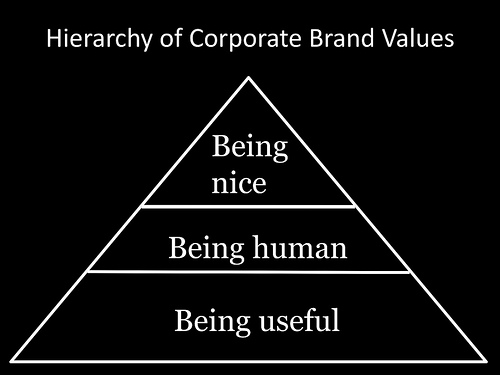You brand yourself every day by what you attend to, how you treat your employees, your level of self-control, your managerial style, your approach to decision making and your communication skills.
The image shown here describes a hierarchy of corporate values that could apply also to personal branding – being nice, being human, being useful.
Branding is what sets you apart, differentiates you from other managers in your organization and industry.
Branding has a lot to do with association. We associate courageous leadership and commitment to justice with Nelson Mandela – just as we associate quality with the Mercedes Benz car.
Personal branding is built up over time and we are often unconscious of it as managers (we have lots of other things to worry about). Yet, whether we attend to it or not, we are branding ourselves daily by our words and actions (…and our inaction).
I have been working with hundreds of middle level managers and often ask them to describe the characteristics of their worst and best bosses.
They have no trouble identifying the traits of the worst managers, but frequently have difficulty talking about the characteristics of their best manager – because good models are few and far between.
Typically the worst managers are identified as “self-serving”, “bullies”, “dis-engaged”, “indecisive” and “over-controlling”. The best managers, on the other hand, are associated with characteristics such as “integrity”, “proactive”, “respects and develops employee’s capability”, “self-aware”, “consistent” and “good advocate”.
Branding does not only occur within the organization. Your activities outside the organization also help to shape people’s image of you as a manager.
For example, I had been doing a lot of work outside my organization helping managers to develop an action learning approach to organization development. A new manager arrived from another State and started networking with his Industrial Relations contacts in other organizations. After a month, he came up to me and said, “You are highly regarded out there for your contribution.” At the time, I had little to do with IR and was not conscious of this impact.
But the moral of the story is that contribution to other organizations counts towards personal branding as a manager. This contribution may involve sharing knowledge, skills and experience in professional associations, industry networks, government consultative bodies and/or charitable organizations.
In the final analysis, branding is what I call “value attribution” – people attribute a value to you. Thus the “being human” and “being useful” aspect of personal branding comes into focus.
Personal branding is like the “goodwill” of a company or, as they say in Internet marketing circles, it’s about “social equity”.
Challenge questions : How are your branding yourself – how would people describe you as a manager? What is your contribution outside your organization?
Photo credit: renaissancechambara

